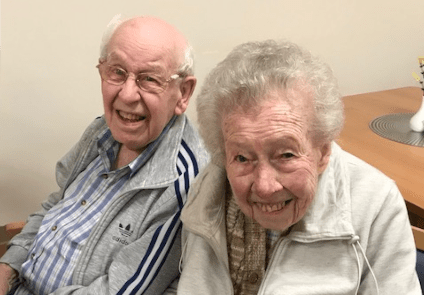Rita's Story - From Bapatla India to Woodport Retirement Village

My father was born in Australia and was an Officer in The Salvation Army. After living in New Zealand for almost 16 years he migrated to India and answered the call to a life as a missionary.
Meanwhile, my mother, who was also a Salvation Army Officer, also migrated from Norwich in England to India in 1921.
My parents later met in Madras and after marrying moved to a town on the plains called Bapatla, where they lived for 18 years.
My father's first job was to train people in India who wanted to become ministers in The Salvation Army.
When they moved to Bapatla, he became the manager of a large training college as well as overseeing a boys boarding college. My mother helped him with his work but she also had her own role. She dedicated her time to serving people in a leprosy colony, where about 250 people lived.
Over time, she taught people who lived in the colony to knit, producing exquisite work. My parents were so enthusiastic about the knitting project that they bought all the umbrellas at the local market. They then used the ribs from the umbrellas as knitting needles.
My mother also approached mills and organisations, asking them to donate wool and materials. This project created a wonderful creative outlet for people who were sadly neglected by society.
In due course and with little fuss, I made my appearance. In those days (and still today in some places), girls were considered very unimportant.
"When my mother asked for a telegram to be sent to her husband to let him know he was a father, the hospital staff considered it to be of so little account that they didn't bother."
When my father finally returned and visited the hospital, the first he knew of his new baby was when the nurse greeted him at the door.
In true spirit, or perhaps in defiance, my parents went on to produce a further two daughters, my sisters Edna and Ruth.
There was always help around the house with a cook and amahs to look after us. The family cook was the soul of discretion and scrupulously clean. However, if ever mother had the temerity to reprimand him, his reaction was to purposely ensure the next meal was served cold.
"Life was very easy in the compound, without any dangers, and doors were not locked or closed. There was no thought of anybody stealing anything and we children led a happy and carefree life."
At six years of age I was sent off to boarding school. The school, called Hebron, was about 300 miles from Bapatla in the Nilgiri Hills, and 8,000 feet above sea level.
There were 90 students, all from European families. In those days, Indian and Anglo-Indian children were not permitted to attend the same school. Most of the students were children of military or government personnel, although there was a child whose father was a jockey and another whose father was a pilot - a rare novelty in those days.
The school was beautiful, and behind it lay the magnificent tea plantations where we used to play.
Although non-denominational, the school was strictly run and church played an important role. All the teachers were women, either from England or Australia, and the curriculum was the same as that used in England.
During my time at Hebron, two sisters acted as joint principals and they were very strict - one used to walk around with a stick behind her back. I well remember talking in line one day as we marched up the long drive to church and feeling the sting of the dreaded stick.
The Salvation Army had a guesthouse near to the school and each family had its own suite of rooms, sharing a community kitchen and dining room.
Despite having to be sent off to boarding school and being away from home, our family was loving and close knit. When we were on holiday, my parents spent a lot of time playing with us and storing up on good times.
Our family was in India for 19 years, and in those days people in missionary services were allowed only six months leave every seven years. In 1940, just prior to finishing my final year at school, we returned to Australia.
"I've never been back to India, but maintain contact with one of my classmates, who now lives in America."
While my parents continued their work with The Salvation Army, this time with the Red Shield, I went off to business college, got a job, and in time met and married John, settling down to domestic life.
John and Rita Biesheuval moved to Tea Gardens Grance in 1999 and were among the village's first residents. Apart from enjoying their new home with their dog, Jamie, they undertook the enormous tasks of bringing some organisation to the community library. Later in life, John had a stroke and they found it necessary to leave Tea Gardens. They now call Aged Care Plus Woodport Retirement Village, home.


